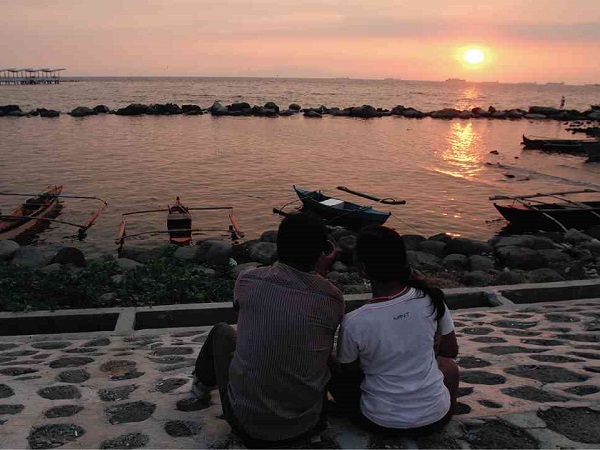
CHANGING HORIZON Lovers enjoy the famous Manila Bay sunset from behind the Senate complex in Pasay City, a still relatively uncluttered view that may not last long. The Court of Appeals on Friday denied a petition to stop a P14-billion reclamation project on the Las Piñas-Parañaque side of the bay. JOAN BONDOC
Suffering a legal setback on Friday, groups opposed to a P14-billion reclamation project near a protected bird sanctuary on Manila Bay vowed to continue the fight in court.
This was after the Court of Appeals dismissed a petition to stop the 635-hectare project, which critics led by former Las Piñas representative and now senatorial candidate Cynthia Villar saw as a potential cause of flooding in surrounding communities and a threat to the Las Piñas-Parañaque Critical Habitat and Ecotourism Area (LPPCHEA).
The CA’s 3rd Division said there was “no credible, competent, and reliable evidence” to support such dire scenarios and that these were already disproved in scientific studies by experts of international repute.
“We will continue to oppose the reclamation. We will pursue other available legal options,” Villar told the Inquirer.
‘Impending damage’
“We did our best to show the court the negative consequences and impending damage that the planned reclamation will bring about. The over 300,000 people who signed the petition are counting on me to fight for them. I will do all that I possibly can for them,” she added.
On March 16, 2012, Villar filed a petition for a writ of kalikasan—a legal instrument similar to a temporary restraining order—in the Supreme Court to block the project.
She claimed to have the backing of 315,849 Las Piñas residents who signed the petition, and also presented a study by hydrological consultant Tricore Solutions Inc.
The petition named the project proponents as respondents, namely private developer Alltech Contractors Inc., the Philippine Reclamation Authority, the Department of Environment and Natural Resources, the DENR’s Environmental Management Bureau and the city government of Las Piñas which is headed by Villar’s brother, Mayor Vergel Aguilar.
Villar then argued that the project would endanger bird and wildlife habitats in the 175-hectare LPPCHEA, impede the natural flow of the Las Piñas, Parañaque and Zapote rivers, and cause flooding in the coastal areas of the two cities as well as in neighboring Bacoor, Cavite province.
Lacking merit, premature
The high court later remanded the case to the Court of Appeals, including Villar’s plea for an environmental protection order that would stop the project for good.
But in a 48-page ruling dated April 26 and released Friday, the CA’s 3rd Division chaired by Justice Rebecca de Guia-Salvador said it found “neither legal nor factual bases” to grant a writ of kalikasan and denied the petition for lack of merit and for being premature.
“No credible, competent and reliable evidence had been presented to support the allegations that the proposed coastal project would cause environmental damage of such magnitude as to prejudice the lives, health or properties of the residents of Parañaque and Las Piñas,” said the ruling penned by Justice Apolinario Bruselas.
“These apprehensions had been disproved by objective, expert and scientific studies of reputable entities with vast international experience,” it added.
Salvador and the third member of the division, Justice Samuel Gaerland, concurred.
The CA held a series of hearings on the petition from October 2012 to April this year, according to Villar’s office.
Contractor’s defense
In defense of the project, Alltech said the channels to be created in the reclaimed land and additional works to free the rivers of garbage, debris, silt and informal settlers will not result in increased inland flooding.
Although it has already secured an environmental compliance certificate, Alltech has not yet started the actual reclamation as it still has to comply with other requirements before being issued a notice to proceed by the PRA.
“Petitioner Villar failed to support her claim by competent, credible and reliable evidence that the proposed reclamation project will expose her and the residents and their properties to catastrophic environmental damage,” the justices said.
“The credibility, reliability and objectivity of the scientific studies presented by respondent Alltech and the totality of the evidence presented leave very little occasion to ponder that the constitutional right of the people to a balanced and healthful ecology hangs in the balance because of the reclamation project,” they added. With a report from Alex Austria